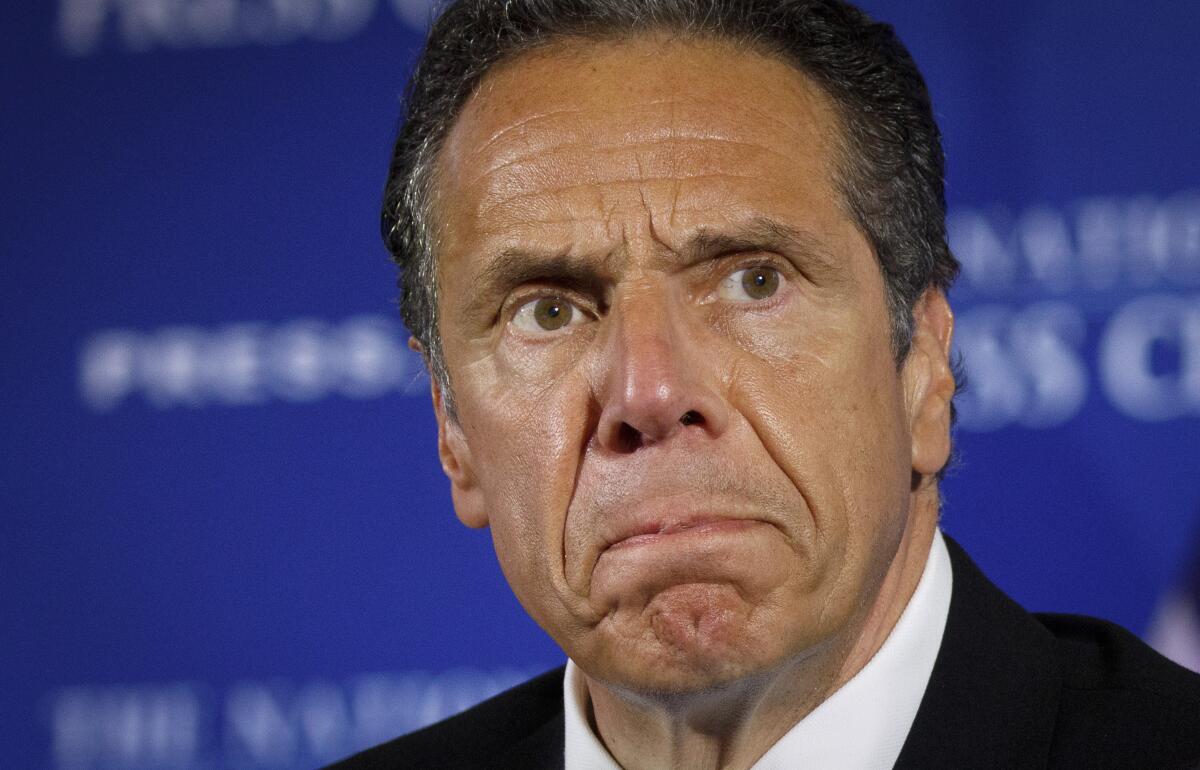Supreme Court gives National Rifle Assn. a 1st Amendment win in suit against New York officials

- Share via
WASHINGTON — The National Rifle Assn., best known for advocating for gun rights under the 2nd Amendment, won an unusual 1st Amendment free speech decision from the Supreme Court on Thursday.
In a 9-0 ruling, the justices agreed the NRA had a plausible free speech claim that it had been targeted for harassment and threatened by state financial regulators in New York because of its advocacy for gun rights.
“Government officials cannot attempt to coerce private parties in order to punish or suppress views that the government disfavors,” Justice Sonia Sotomayor said for the court.
In the past, the court has said public officials have free speech rights to advocate for their policies and to encourage others to follow their guidance.
But in this case, the court said state officials can go too far and violate the 1st Amendment if they use their authority to threaten or punish organizations whose views they oppose.
The NRA said it sued then-New York Gov. Andrew Cuomo and Maria Vullo, his state superintendent for financial services, after they issued formal guidance letters urging every bank and insurance company to “sever their ties” with the gun rights group.
Cuomo tweeted: “We’re forcing the NRA into financial jeopardy. We won’t stop until we shut them down.”
The NRA sued, alleging the group was being punished for its views in violation of the 1st Amendment. Their claim was tossed out by the 2nd Circuit Court in New York, which said Vullo’s words were “intended to persuade rather than intimidate.”
But the Supreme Court agreed to hear the NRA’s appeal and all nine justices said words and actions of the state superintendent looked more like official threats and a misuse of government power.
“In sum, the complaint, assessed as a whole, plausibly alleges that Vullo threatened to wield her power against those refusing to aid her campaign to punish the NRA’s gun-promotion advocacy. If true, that violates the 1st Amendment,” Sotomayor said.
ACLU national legal director David Cole had argued the case on behalf of the NRA. This “was a campaign by the state’s highest political officials to use their power to coerce a boycott of a political advocacy organization because they disagreed with its advocacy,” he told the justices.
Cole and the ACLU welcomed the ruling. “Today’s decision confirms that government officials have no business using their regulatory authority to blacklist disfavored political groups,” he said.
“While the ACLU stands in stark opposition to the NRA on many issues, it represented the group to safeguard the 1st Amendment rights of all advocacy organizations,” he said. “Across the country, organizations in the fight for racial justice, criminal legal reform, reproductive and LGBTQ rights too often face attacks by state and local government overreach officials who disagree with their point of view. If the court had allowed New York to blacklist a powerful organization like the NRA, government officials would have had even greater power to target less powerful organizations — especially those who speak for our most vulnerable communities.”
The line between government persuasion and official threats has drawn the court’s attention this year. Still pending is the Biden administration’s challenge to a Louisiana judge’s order that accused the White House of “government censorship” of conservative views on social media.
The administration said it had alerted these platforms about disinformation regarding COVID-19 and vaccines, and urged these posts be taken down. State attorneys from Louisiana and Missouri sued and described this as censorship.
In March, the justices heard arguments in this case, Murthy vs. Missouri, on the same day they heard the NRA’s case.
Solicitor Gen. Elizabeth Prelogar said the officials who contacted social media sites did not use threats. Instead, she said, they warned the social media platforms about false and dangerous postings.
But the justices sounded divided and at times hinted they might dispose of the case by ruling that state attorneys did not have standing to sue on behalf of the platforms.
The administration also backed the NRA’s free speech claim, but it urged the justices to make clear that government officials cannot be sued simply for strongly arguing against the views of groups like the NRA.
Sotomayor’s opinion does that. “Nothing in this case gives advocacy groups like the NRA a right to absolute immunity from [government] investigation, or a right to disregard [state or federal] laws,” she wrote. “Similarly, nothing here prevents government officials from forcefully condemning views with which they disagree.”
More to Read
Sign up for Essential California
The most important California stories and recommendations in your inbox every morning.
You may occasionally receive promotional content from the Los Angeles Times.














